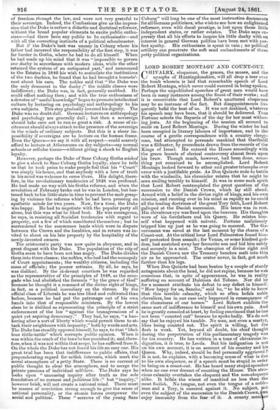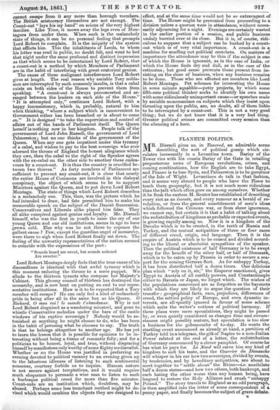LORD ROBERT MONTAGU AND COUNT-OUT.
CHIVALRY, eloquence, the graces, the muses, and the nymphs of Huntingdonshire, will all drop a tear over the tomb wherein is laid that remarkable speech of Lord Robert Montagu, which never could succeed in being spoken. Perhaps the unpublished speeches of great men would have been in many instances among the finest of their works ; and it is conceivable that Lord Robert's unuttered eloquence may be an instance of the fact. But disappointments fre- quently befal the best of us. It was not destined, whatever his speech may have been, that it should be delivered. Thus Fortune selects the Bayards of the day for her most wither- ing jests. At the beginning of the session all seemed to smile on Lord Robert Montagu. During the winter he had been occupied in literary labours of importance, and in the course of a gentle correspondence with a country clergy- man, had attempted to persuade mankind that Garibaldi was a filibuster, by precedents drawn from the records of the Kings of Israel. He entered the House accordingly with the green laurels of clerical controversy almost fresh upon his brow. Though much, however, had been done, some- thing yet remained to be accomplished. Lord Robert Montagu looked forward to other and greater triumphs over error with a justifiable pride. As Don Quixote rode to battle with the windmills, his chronicler relates that he might be seen smiling terribly to himself. It was in some such spirit that Lord Robert contemplated the great question of the succession to the Danish Crown, which lay still ahead. Armed with a belief iu the divine right of kings, and his own mission, and running over in his mind as rapidly as he could all the leading doctrines of the great Tory faith, Lord Robert galloped at the Danish succession. His lance was in rest. His chivalrous eye was fixed upon the heavens. His thoughts were of his forefathers and his Queen. He relates him- self what happened with naivete. Fortune maliciously tripped him up just as he was going to succeed. The Go- vernment was saved at the last moment by the charm of a Count-out. At the critical hour Lord Palmerston found him- self protected from assault ; for Venus, or some kindred god- dess, had snatched away her favourite son and hid him safely and securely in a mist. The champion of divine right and the Danish Crown saw the Treasury benches melt into thin air as he approached. The orator never, in fact, got much further than his legs. When Don Quixote had been beaten by a couple of sturdy antagonists about the head, he did not repine, because he was conscious that, in spite of appearances, he was in reality suffering on account of Dulcinea del Toboso. Nor did he for a moment attribute his defeat to any defect in himself. " How happy for us, Sancho," said he, " to be able to know that this terrible calamity, which so often befals noble chevaliers, has in our case only happened in consequence of the clumsiness of our horses." Lord Robert exhibits the same sort of indifference to himself and his own pain. And he is greatly consoled at heart, by feeling convinced that he has not been " counted out" because he spoke badly. We do not say that he enjoyed his tumble. No man, not even a martyr, likes being counted out. The spirit is willing, but the flesh is weak. Yet, beyond all doubt, his chief thought during the perpetration of this parliamentary tragedy was for his country. He has written in a tone of chivalrous in- dignation, it is true, to Leeds. But his indignation is not on his own account, it is on account of his country and his Queen. Why, indeed, should he feel personally aggrieved ? It is not, he explains, with a becoming sense of what is due to his own eloquence, as if a speech must be stupid in order to bring on a count-out. He has heard many stupid speeches when no one ever dreamt of counting the House. This atro- cious calamity overtakes the eloquent and the non-eloquent alike. It befals the wisest of mankind no less than the most foolish. No tongue, not even the tongue of a noble- man and a Tory, is ensured against it. No subject, of even the subject of the succession to the Danish Crown, n enjoy immunity from the fear of it. A county. mem r cannot escape from it any more than borough members. The British aristocracy themselves are not exempt. The Count-out " lays his icy hand" on scions of the very highest families. Like Time, it mows away the legs even of Mon- tagues from under them. When such is the melancholy state of things, it can be no personal feeling that prompts Lord Robert to complain. It is the iniquity of the system that afflicts him. This the inhabitants of Leeds, to whom his letter was read in public, no doubt felt, and went to bed that night under the same profound and distinct impression as that which seems to be entertained by Lord Robert, that a count-out is a method by which Members of Parliament are in the habit of interfering with great oratorical genius.
The cause of these malignant interferences Lord Robert gives at length. The real reason why amiable Tory noble- men are interrupted by such unseemly insults, is that a cabal exists on both sides of the House to prevent them from speaking. " A count-out is always preconcerted and ar- ranged between the leaders on each side of the House." " It is attempted only," continues Lord Robert, with a happy inconsistency, which is, probably, natural to him when thinking, "where a subject which is inconvenient to Government either has been broached or is about to come on." It is designed " to take the supervision and control of affairs out of the hands of Parliament itself. The Queen herself is nothing now in her kingdom. People talk of the government of Lord Sohn Russell, the government of Lord Palmerston; but no one thinks of the government of the Queen. When any one gets impatient under this tyranny of a cabal, and wishes to pay to the best sovereign who ever adorned the throne of England the honest allegiance which they owe, then the cabal to the right of the Speaker agrees with the ex-cabal on the other side to smother these endea- vours by a count-out. It is thus the country is crucified be- tween two thieves." As forty members of Parliament are sufficient to prevent any count-out, it is clear that nearly the entire House of Commons are involved in this disloyal conspiracy, the object of which seems to be to support Ministers against the Queen, and to put down Lord Robert Montagu. The state of things which Lord Robert describes is a melancholy one. This, then, was the picture which he had intended to draw, had fate permitted him to make his memorable speech on the subject of the Danish Succession. Conservatives and Liberals alike played him false. They all alike conspired against genius and loyalty. Mr. Disraeli himself, who was the first in youth to raise the cry of our young Queen and our old institutions, seems in age to have grown cold. Else why was he not there to espouse the gallant cause ? Few, except the guardian angel of monarchy, were there to sigh when Lord Robert finally sat down. The feeling of the unworthy representatives of the nation seemed to coincide with the expressions of the poet : " Sounds heard are sweet, but sounds unheard Are sweeter."
Lord Robert Montagu deeply feels that the true cause of his discomfiture is identical with that awful tyranny which is this moment reducing the throne to a mere puppet. We allude to the thirteen tyrants who compose her Majesty's Cabinet. This gloomy council of thirteen has destroyed the monarchy, and is now bent on putting an end to our repre- sentative institutions. How is it to be expected that a Tory member will escape ? He can only feel a kind of melancholy pride in being after all in the same box as his Queen. 0 Richard, 0 mon roi ! le monde eabandonne. Why is not Lord Robert disguised as a wandering minstrel, and gone to whistle Conservative melodies under the bars of the castle windows of his captive sovereign ? Nobody would be as- tonished at anything he might choose to do, who has been in the habit of perusing what he chooses to say. The truth is that be belongs altogether to another age. He has yet to learn the lesson that it is possible for opinions to be in- teresting without being a tissue of romantic folly; and for a politician to be honest, loyal, and true, without disgracing himself by manifestoes onlyworthy of some flighty medifevalist. Whether or no the House was justified in preferring an evening devoted to political vacancy to an evening given up to the laborious idleness of listening to such sentimental nonsense, courtesy forbids us to inquire. Human nature is not secure against temptations, and it would require much eloquence to persuade a wise man to listen to such a burlesque political creed for more than five minutes. Count-outs are an institution which, doubtless, may be abused. Perhaps some less trenchant method might be de- vised which would combine the objects they are designed to effect, and at the same time would not be so extravagant of time. The House might be prevented from proceeding to a division unless a quorum were in attendance, without neces- sarily adjourning for a night. Evenings are certainly wasted in the earlier portion of a session, and public business unduly hurried over at its close. But it is, of course, ridi- culous to suppose that a subject can be burked by a count- out which is of very vital importance. A count-out is a machine for snuffing out political crotchets. On matters of importance the attendance may be thin if the subject is one of which the House is ignorant, as in the case of India, or which the House finds dry and dull, as in the case of the estimates; but good sense prevents those present from in- sisting on the close of business, 'when any business remains to be done. Those who are affected are members like Lord Robert Montagu. Pet schemes for interesting the House in some minute squabble—petty projects, by which some fifth-rate political thinker seeks to identify his own name with some ridiculously unimportant cause—or speeches made by amiable monomaniacs on subjects which they insist upon thrusting upon the public, are, no doubt, all of them liable to be interrupted by a count-out. This is not a very good thing ; but we do not know that it is a very bad thing. Greater political crimes are committed every session than the silencing of a bore.































 Previous page
Previous page